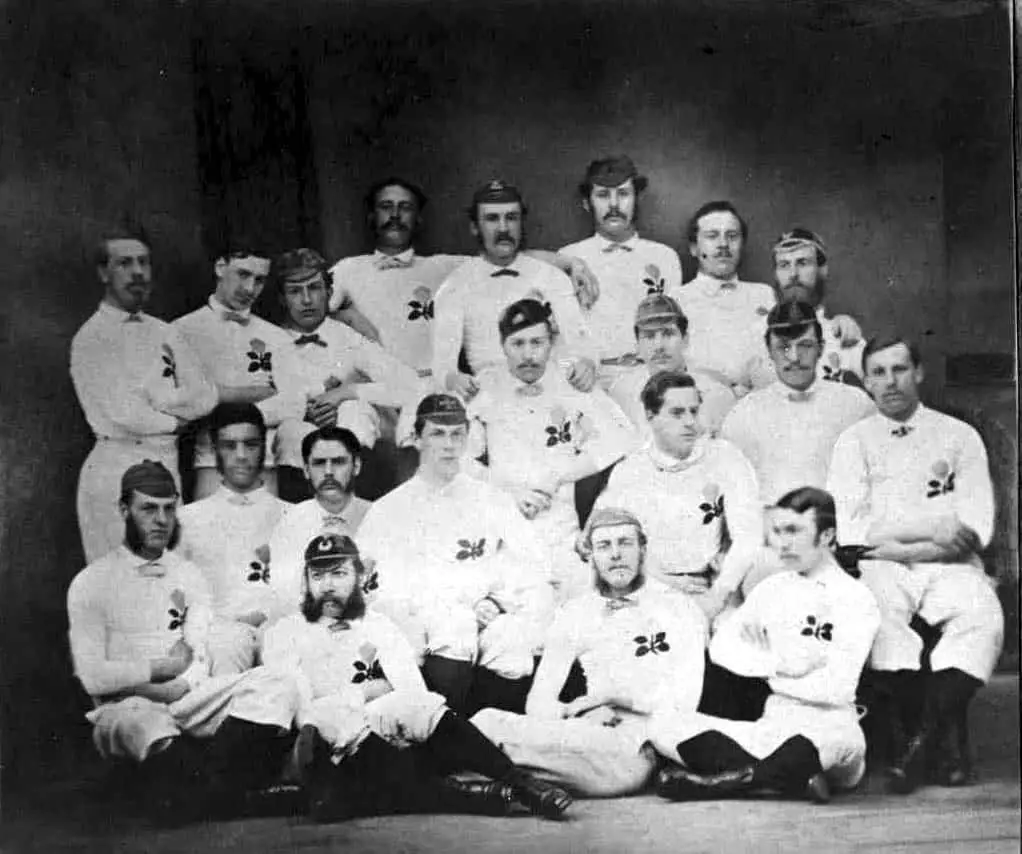The sport of rugby has been around for well over a century. Legend has it that rugby originated in 1823 when William Webb Ellis broke the rules by running with a football in his hands while playing at Rugby School. Rugby union has been an established sport since 1871. But how did it start? And how did it evolve into the sport we know today?
Rugby Union has a long and colorful history, full of stories about the people and places who helped shape the sport. In this article, we will share 14 facts about the history of rugby union everyone should know.
1. First Rugby Club Founded, 1883
Guys Hospital Rugby club is officially acknowledged by the rugby football union as being the world’s oldest rugby club as it has a fixture dating back to 1883 which states that it is celebrating its 40th season of rugby.
Other clubs that also claim to be the world’s oldest but lack the supporting evidence include: Blackheath, Barnes, and Trinity College.
2. Rugby Union Established, 1871
The first rugby union was officially formed on January 26th, 1871. There was a call from some school leaders to establish an official set of rules to make the game easier to play. A group of twenty-one clubs met at the Pall Mall Restaurant in London to agree on these rules. Several of the original clubs present at the meeting are still operating today.
The London Wasps Club was supposed to have a representative present at the meeting, but the man never arrived. Even though it was likely a miscommunication, stories say he missed the train because he was in line for a sandwich. Others say he wound up at a pub with the same name and had a few pints before realizing his mistake.
Why not try our general knowledge Rugby Quiz here?
3. The First International Rugby Match, 1871
The first international rugby match took place on March 27th, 1871, at Raeburn Place in Edinburgh. It was a match between England and Scotland. The game included twenty players on each side, and Scotland won 1-0.

4. The Six Nations Championship Begins, 1883
Initially known as the Home Nations Championship competed for between England, Ireland, Scotland, and Wales, this was the world’s first rugby tournament. France increased the number to five in 1910 and finally Italy were added in 2000 to form what we now know as the 6 Nations Championship.
The Six Nations Championship with all its passions and traditions is the envy of the southern hemisphere and they finally formed their own tri-nations championship played between New Zealand, South Africa and Australia in 1996. The number was increased in 2012 when Argentina joined and it has remained this way ever since.
5. World Rugby Board Established, 1886
The international governing board of rugby union is World Rugby. The board was formed in 1886 and was originally called The International Rugby Football Board. It came about as the result of a contested try in a match between Scotland and England. The original board included Scotland, Wales, and Ireland. The first principles of rugby union were decided upon in 1887.
Recommended reading: Why Play Rugby? 12 Most Popular Reasons
6. Arrogant England Refuse To Join, 1890
England refused to join the original incarnation of the IRFB because they believed they should be awarded a greater percentage of the representation since they had a larger number of clubs. England didn’t officially join the IRFB until 1890, after being banned from games with member nations in the preceding years. They were awarded six seats on the council, while other member nations only had two.
7. Rugby League Breaks Free, 1892
In 1892 a schism occurred in rugby union surrounding missed work payments for players. There was a proposal put forth to allow these payments, but the RFU voted against it. This resulted in the formation of the Northern Rugby Football Union (NU), which led to different rules being adopted for the RFU and the NU code. These are now commonly referred to as rugby union and rugby league.
8. Rugby Becomes An Olympic Sport, 1900
Rugby union was introduced as an Olympic sport in 1900, by a Frenchman named Pierre de Coubertin. The first occurrence of rugby in the Olympics included teams from France, Great Britain, and Germany. France took the gold medal. This form of the game only made appearances in 1900, 1908, 1920, and 1924. It returned to the Olympics in 2016 as Rugby Sevens.
9. First Performing of the Haka, 1905
The New Zealand All Blacks Rugby team is famous for performing the Haka before matches. The first time the Haka was performed in this manner was in 1905, before a match with Wales. In response, the Welsh had one of their players, named Teddy Morgan, sing the Welsh national anthem. This became the first recorded occurrence of a national anthem being sung before a sporting event.
10. Rugby’s Most Famous Whistle, 1905
The same whistle is used for every Rugby World Cup and is over one hundred years old. It is the very whistle that was used by referee Gil Evans during the match between England and New Zealand in 1905.
The whistle is named after him and has also been used in the first ever game between England and New Zealane at Crystal Palace in 1905, the 1924 Olympic Games final in Paris, and it was used in the game that saw the first ever sending off of a player in test match rugby. Cyril Brownlie in 1925 playing for New Zealand against England.
11. The First Women’s Rugby Match, 1917
The first recorded instance of a women’s rugby match was in 1917, during World War II, between the Cardiff Ladies and the Newport Ladies. Opposition to women playing rugby was strong, and it wasn’t until the end of the century that women’s rugby union began to be accepted as a staple of the sport. Since then, unions for women’s rugby have been established worldwide.
12. First World Cup, 1987
The first World Cup for rugby union was held in 1987 and was co-hosted by New Zealand and Australia. There were sixteen participants in the first cup, and it ended with New Zealand defeating France 29-9 in the final. Winners of the World Cup are awarded the “Web Ellis Cup” trophy, named after William Web Ellis, the student who is credited with inventing the game of rugby.
13. Rugby Union Turned Professional, 1995
Rugby became a professional sport in 1995. Before this date, rugby was considered an amateur sport, but with the popularity increasing, there was pressure to turn the sport pro. Because of this, and the added threat of another schism happening, the IRFB agreed to make rugby union an “open sport.”
This announcement came two months after the 1995 rugby world cup hosted in South Africa where it was plain to see that some country’s players were basically operating as professionals already, particularly new Zealand and South Africa.
Recommended Reading: How Much Does A Rugby Player Earn?
14. Northern Hemisphere Win a World Cup, 2003
Finally, against many people’s better judgments England finally secured a first world cup for the northern hemisphere breaking the stranglehold of the southern hemisphere nations.
Victory was sealed for England in an epic encounter when in the second period of extra time, England in an epic encounter, when, in the second period of extra time, England legend Jonny Wilkinson dropped a goal off his wrong right foot to win the game and send the English crowd into raptures.
Rugby has a marvelous past full of characters, traditions and stories. It has attracted thousands of players and spectators around the globe for generations. Why not get involved in the next chapter, find your boots and get down your local rugby club and make some rugby history of your own!
Why not read: Why Is Rugby Sometimes Called Football?
Image Credits
The Jesus College Cambridge Rugby union XV of 1889 Unknown author, Public domain, via Wikimedia Commons.
England V Scotland by Ross and Pringle of George Street – Public Domain, Link
